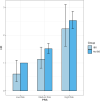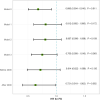Association between irritable bowel syndrome and Parkinson's disease by Cohort study and Mendelian randomization analysis
- PMID: 38548756
- PMCID: PMC10978991
- DOI: 10.1038/s41531-024-00691-5
Association between irritable bowel syndrome and Parkinson's disease by Cohort study and Mendelian randomization analysis
Abstract
This study aimed to investigate the association between irritable bowel syndrome (IBS) and Parkinson's disease (PD) utilizing prospective cohort study and Mendelian randomization. The dataset contained a substantial cohort of 426,911 participants from the UK Biobank, discussing the association between IBS and PD with Cox proportional hazards models and case-control analysis while adjusting for covariates such as age, gender, ethnicity and education level. In univariate Cox regression model, the risk of PD was reduced in IBS patients (HR: 0.774, 95%CI: 0.625-0.956, P = 0.017), but the statistical significance diminished in the three models after adjusting for other variables. In a few subgroup analyses, IBS patients are less likely to develop into PD, and patients diagnosed with IBS after 2000 also had a lower risk (HR: 0.633, 95%CI: 0.403-0.994, P = 0.047) of subsequently developing PD. In addition, we matched five healthy control participants based on gender and age at the end of the study for each IBS patient diagnosed during the follow-up period, and logistic regression results (OR:1.239, 95%CI: 0.896-1.680, P = 0.181) showed that IBS was not associated with the risk of PD. Mendelian randomization did not find significant evidence of the causal relationship between IBS and Parkinson's disease (OR: 0.801, 95%CI: 0.570-1.278, P = 0.204). Overall, we suggest that IBS status is not associated with the risk of developing PD, and that these findings provide valuable insights into the clinical management and resource allocation of patients with IBS.
© 2024. The Author(s).
Conflict of interest statement
All authors declare no competing interests.
Figures





References
LinkOut - more resources
Full Text Sources

